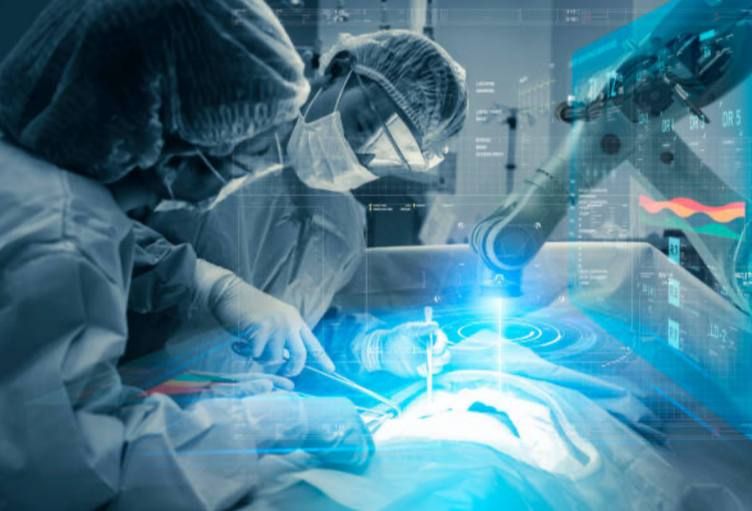The Rise of Medical AI: How Technology Is Rewriting the Future of Healthcare Jobs
Medical AI is transforming healthcare , but are your teams ready? Learn how workforce development, upskilling, and immersive learning can help healthcare professionals thrive alongside AI.


Table of Contents
Share this article
Table of Contents
Share this article
The Rise of Medical AI: How Technology Is Rewriting the Future of Healthcare Jobs
“What happens to doctors, nurses, and lab technicians when machines start reading scans better than humans?”
It’s a question that keeps healthcare professionals up at night. The rise of medical AI is no longer science fiction. From diagnostic tools to robotic surgery assistants, AI is transforming how care is delivered and how healthcare jobs will look in the next decade.
But with transformation comes tension. Many organizations and professionals are asking: Will AI replace us, or can we learn to work with it?
Let’s break it down and explore how workforce development and upskilling can turn this challenge into an opportunity.
The Problem: Skills Gap in the Age of Medical AI
Healthcare is evolving fast. AI-powered tools can analyze imaging scans, predict patient outcomes, and even suggest treatment plans. But while technology is advancing, human skills aren’t keeping pace.
Here’s the challenge:
• Doctors and nurses lack AI literacy. Many have never interacted with predictive analytics or machine learning systems.
• Hospitals face operational slowdowns. Without trained staff, AI tools sit idle or are misused.
• The future of work is uncertain. Employees worry about job security while employers scramble to integrate AI effectively.
In short, the skills gap is real and costly. Inefficient AI adoption can slow operations, compromise patient outcomes, and leave healthcare teams frustrated.
Why This Happens: The Human Side of AI Adoption
It’s tempting to think AI alone will solve problems. But the reality is different: technology only works when people know how to use it.
Organizations often invest millions in AI tools, yet neglect employee training and workforce development. This creates a paradox: the more advanced the technology, the bigger the skills gap.
Here’s what it costs:
• Increased errors and inefficiencies when staff aren’t properly trained.
• Higher turnover as employees feel unprepared or threatened by automation.
• Stunted innovation because teams lack confidence in new tools.
The takeaway? Workforce readiness isn’t optional - it’s essential.
The Solution: Upskilling and Workforce Transformation
The good news? Skills gaps can be bridged with the right approach. Tenyne’s offerings from Workforce programs to Forte Metaversity and consulting services are designed to help teams build the skills they need for a rapidly changing workplace.
Here’s how organizations can stay ahead:
- Assess the skills gap:
Identify which employees need AI literacy, data interpretation skills, or digital workflow training. - Engage in immersive learning:
Interactive modules, simulations, and hands-on practice make learning practical and memorable. - Provide guidance and strategy:
Consulting support helps organizations integrate AI tools effectively, ensuring teams know how to apply their learning on the job. - Track progress and adapt:
Measure improvement in AI usage and workflow efficiency, then refine training as needed.
By combining workforce development, immersive learning, and strategic guidance, organizations can turn AI from a source of stress into a productivity and innovation booster.
AI as a Co-Pilot, Not a Pilot
Think of AI like a co-pilot in an airplane. The plane can fly itself, but the co-pilot helps navigate turbulence, make critical decisions, and keep passengers safe.
If the co-pilot doesn’t know how to read the instruments or communicate with the main pilot, the flight can get messy , even dangerous.
Similarly, AI in healthcare can provide incredible insights, but human skills are what make it truly effective. Upskilling your team is like training every co-pilot to work seamlessly with advanced technology.
Key Lessons for the Future of Healthcare Jobs
• AI amplifies human potential, it doesn’t replace it. Your team’s ability to adapt and learn determines the value of AI.
• Upskilling is a strategic investment. Well-trained employees save time, reduce errors, and improve patient outcomes.
• Continuous learning is the new baseline. Organizations that embed workforce development into their culture will thrive in the AI era.
The future of work in healthcare isn’t just about machines , it’s about people who can work alongside them.
Conclusion: Skill Agility as a Competitive Edge
Medical AI is here to stay. But the real winners won’t just have the latest technology. They’ll have teams ready to adapt, learn, and innovate.
Upskilling, workforce development, immersive learning, and strategic guidance are no longer optional. They’re your pathway to better patient care, more efficient operations, and a future-ready workforce.
Take control of the AI-driven future of healthcare. Equip your team with the skills, confidence, and strategies to thrive , not just survive. Explore Tenyne Workforce for tailored upskilling programs, dive into Forte Metaversity for immersive, hands-on learning, or leverage Tenyne’s consulting services to design a future-ready workforce.
Don’t wait for change to happen , shape it with Tenyne.
👉 Visit tenyne.com today
Related Articles
Continue exploring workforce technology insights
Never Miss an Insight
Subscribe to our newsletter for the latest workforce technology insights, research findings, and practical guides delivered to your inbox.


